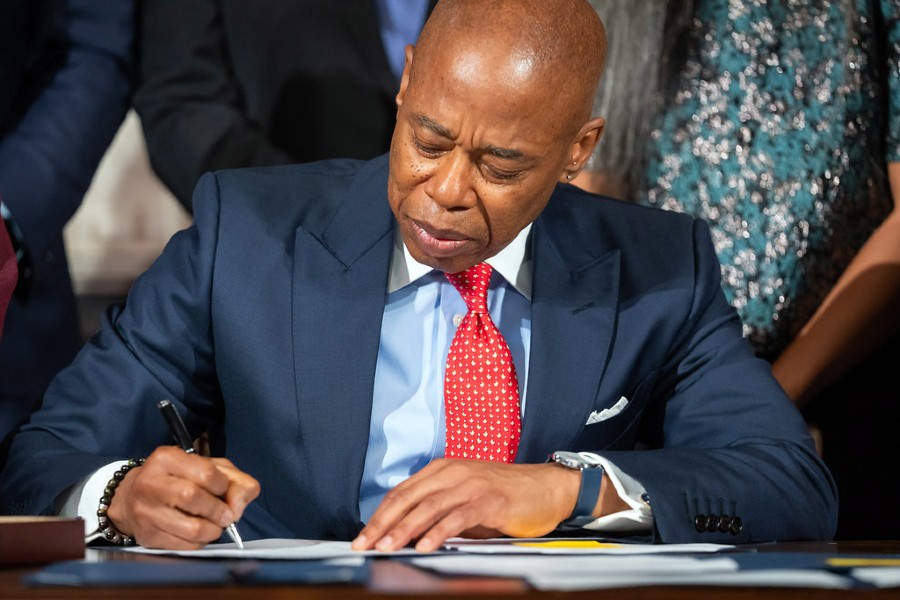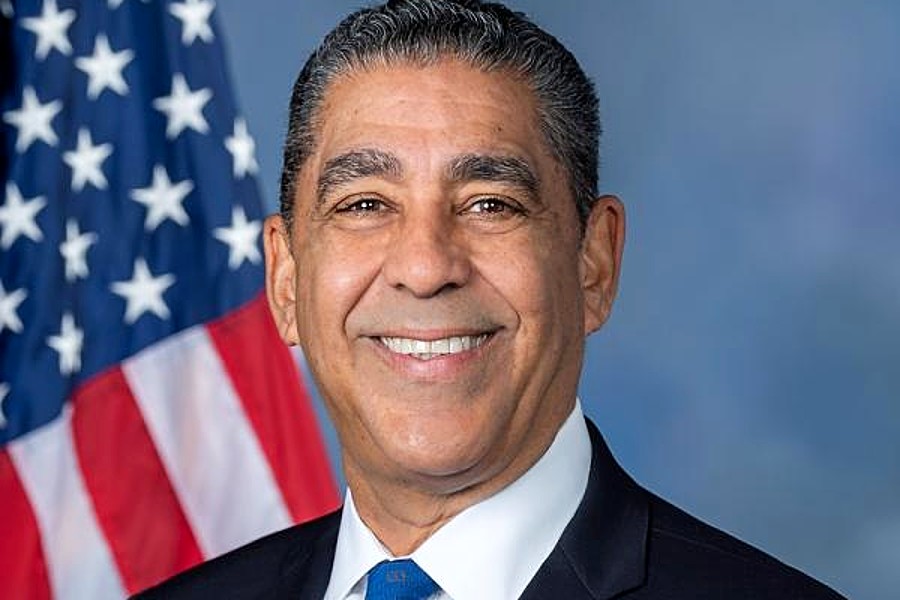
Top New York legislators joined leaders in government, academia, health care, and maternal health advocacy at New York University.
The event will take place on Thursday to discuss legislative responses in Albany and New York City to the ongoing crisis in Black maternal health, as well as ways for supporters to help advance those priorities.
The event provided attendees with a comprehensive, expert-informed understanding of the underlying issues driving elevated levels of maternal mortality in New York, which disproportionately impact communities of color. Black women in the state are five times more likely to die in childbirth than their white counterparts.
Legislators from the New York State Senate and Assembly, New York City Council, as well as leaders and policymakers from the New York City Mayor’s Office and Department of Health, discussed efforts at various levels of government to address those same underlying issues, while providing a roadmap for ways the State legislature, New York City Council, and advocates can work together to move forward shared goals of reducing maternal mortality going forward.
“As a Black mother and grandmother, addressing the alarming racial disparities in maternal mortality is deeply personal to me,” said New York State Senate Majority Leader Andrea Stewart-Cousins, who opened the with comments Thursday. “In New York, the maternal mortality rate for Black mothers is five times higher than that of their white peers, underscoring a crisis that demands urgent action. Under my leadership, the New York Senate has passed crucial legislation to improve maternal health and tackle these disparities. We’ve enhanced access to reproductive healthcare, including Medicaid coverage for doula services, and allocated $5 million for maternal health grants. At a time when reproductive healthcare is under attack throughout the nation, we are committed to continuing the work to improve maternal health outcomes for all pregnant New Yorkers.”
“As we confront the stark disparities in Black maternal health, we must prioritize equitable care and recognize that structural racism isn’t just a challenge—it’s a matter of life or death,” said NYC Chief Equity Officer and Mayor’s Office of Equity & Racial Justice Commissioner Sideya Sherman. “Through NYC Her Future, we are proud to launch targeted programs aimed at increasing the number of doula practitioners in our city, ensuring that more families have access to this essential care. Our mission is clear: to advance racial and gender equity and build a future where every parent receives the dignity, care, and support they deserve.”
The event, “Saving Lives, Shaping Policy: A Legislative Breakfast on Black Maternal Health” — hosted by the NYU McSilver Institute of Poverty Policy and Research and moderated by author, journalist, and member of the NYC Commission on Gender Equity, Eboni K. Williams–is the latest in a series of conversations focused on raising awareness and advancing a policy program to tackle the unacceptably high rates of maternal mortality in New York’s communities of color. NYU McSilver partnered with the New York State Office of the Attorney General and others to present “Equity in Every Birth: A Call to Action to Advance Black Maternal Health” during the 53rd Annual Caucus Weekend in Albany in February 2024. In April 2023, NYU McSilver co-sponsored the healthcare professional-led virtual community forum “Centering Voices: The Crisis of Black Maternal Health.”
The NYU McSilver Institute’s Executive Director Rose Pierre-Louis said, “Far too many families in our communities are living the painful realities that underlie the statistics. The NYU McSilver Institute is honored to be able to bring together so many important decision makers at the state and city level who are committed to making significant, tangible change in the lives of birthing people across the state. McSilver will continue to leverage research as a tool to influence policy that leads to change in the communities we serve, and thank the leaders who are working to do just that in government, advocacy, and academia that joined us today.”
“Saving Lives, Shaping Policy” sought specifically to bring legislators from New York State and City together to discuss their priorities as a way of building momentum around critical policy solutions. Members of the state legislature discussed aspects of what they described as the “maternal health equity agenda” they planned to advance in next year’s legislative session, which includes measures to permit birthing doulas in hospital emergency rooms, increased access to maternal medical procedures such as remote ultrasounds and transvaginal ultrasounds, and maternal depression screenings, among a number of priorities.
New York State Senators Samra G. Brouk and Lea Webb, Assembly Members Rodneyse Bichotte Hermelyn and Michaelle C. Solages, New York City Council Member Farah N. Louis, and NYC Her Future Executive Director Nathifa Forde participated in a panel discussion focused on legislative successes and priorities.
“My maternal health equity agenda began with securing statewide Medicaid reimbursement for doula care — and continues with advocating for the governor to sign my bill to make maternal depression screenings more accessible and available for all birthing individuals in New York State,” State Senator Brouk said. “To combat the black maternal mortality crisis, we need to listen to black mothers and prioritize their needs when introducing policies that impact their livelihoods.”
“I would like to thank NYU McSilver for hosting such an important discussion on Black Maternal Health,” said State Senator Webb. “As the Chair of Women’s Issues in the Senate, it is imperative that state and city legislative leaders, and all of our community stakeholders work together to address maternal mortality which disproportionately impacts Black women. It is through conversations like these that we can advance policies to improve maternal health outcomes for women across the state of New York.”
New York State Assemblymember Solages said, “In New York State, we’ve made significant strides in addressing the maternal mortality crisis. Birth should be a time of joy, not concern for health or safety, and by expanding access to doulas and enhancing maternal depression screenings, the legislature is working to close critical gaps in maternal health outcomes. This crisis demands thoughtful and effective policy solutions at both the state and local levels. We must continue this vital work to make New York a safer, healthier place for all mothers and their children. I thank NYU McSilver, my colleagues in government, and the many advocates who are committed to tackling this urgent issue.”

“I thank NYU McSilver for hosting today’s vital Black maternal health event, which convened leaders in government, healthcare, and maternal health advocacy, as we formed a dynamic action plan to make motherhood safer for all. Together, we’re taking tangible steps to address the root causes of this ongoing crisis that’s plaguing our communities, while dismantling the disproportionate disparities that far too many mothers are facing,” New York State Assemblymember Bichotte Hermelyn said. “We’ve made strides to tackle the maternal healthcare crisis, but the uphill battle to protect Black mothers is far from over. This fight for me continues in Albany, where we must relentlessly press forward to ensure that every New Yorker can experience a safe and healthy motherhood.”
In the City members of the New York City Council likewise identified legislation they are currently prioritizing to address the array of issues facing communities across the city. These include mandating more public disclosure of maternal mortality information from city officials, new procedures for city health officials to work together to address ongoing issues, and new information requirements to provide new parents information on resources, as well as other measures.
“I was honored to speak at the NYU McSilver Institute for Poverty Policy and Research panel ‘Saving Lives, Shaping Policy,’ where we discussed critically needed solutions to the ongoing crisis in Black maternal health in New York City. Engaging with fellow legislators, policy advocates, scholars, and healthcare professionals is essential to addressing the maternal mortality disparities that disproportionately affect Black women in our city,” said Council Member Louis, Chair of the Council’s Committee on Women and Gender Equity. “I was proud to highlight the work of my committee to tackle these disparities and demand accountability, ensuring safeguards for our most vulnerable birthing individuals. I applaud Rose Pierre-Louis and the McSilver Institute for their leadership in convening this vital conversation. Together, through these discussions and our collective efforts across industries, we can create a city where maternal health is among the best in the nation. I look forward to continuing our work to ensure that every birthing person in our city and state has access to the care and support they deserve.”
According to the most recent data from the New York State Department of Health, pregnancy-related deaths in Black communities across the state were five-times higher than in the white community. Within New York City, that rate increased to six-times higher, according to the New York City Department of Health and Mental Hygiene. The New York Times reports that nearly two-dozen women in New York City typically die each year from causes related to pregnancy or childbirth.
Legislators and elected officials in New York State and City have recently taken measures to address the maternal mortality crisis. Last November, Governor Kathy Hochul signed a pair of bills focused on expanding doula care across the state, as well as $4.5 million in additional funding for regional perinatal centers. In New York City, similar expansions in doula access were signed into law by Mayor Eric Adams in 2022. Earlier this month, Council Speaker Adams declared pregnancy-associated deaths a public health crisis, and called on stakeholders to prioritize confronting maternal mortality.
“Black maternal health affects more than just Black women. Black maternal health and mortality affect our communities as a whole,” said NYC Her Future Executive Director Nathifa Forde. “I am honored to participate in this critical event to highlight how this is a community issue, and to discuss potential strategies that reshape policies and practices that protect and empower all those who give life. NYC Her Future is committed to working with healthcare professionals and community leaders to address these disparities head-on. Through programs like Health Career Connect and the Doula Training Program, we are investing in providing professionals the culturally-relevant tools needed to serve families of color with the goal of minimizing the effects of institutionalized inequities within the healthcare system – specifically those systems that impact the birthing process. When we improve Black maternal health outcomes, we strengthen the fabric of our entire community.”
“Saving Lives, Shaping Policy” was made possible through the support of a number of New York groups committed to addressing maternal mortality through concrete policy action. The NYU McSilver Institute was joined by:
• The Links Incorporated New York Chapter
• NYC Mayor’s Office of Equity & Racial Justice
• National Action Network
• NYU Rory Meyers College of Nursing
• New York Urban League
• One Brooklyn Health
• NYC Commission on Gender Equity
• NYC Her Future
• NYU Silver School of Social Work
• Columbia School of Social Work
The McSilver Institute
The NYU McSilver Institute for Poverty Policy and Research committed to creating new knowledge about the root causes of poverty, developing evidence-based interventions to address its consequences, and rapidly translating research findings into action through policy and best practices. Learn more at mcsilver.nyu.edu.
Become a Harlem Insider!
By submitting this form, you are consenting to receive marketing emails from: . You can revoke your consent to receive emails at any time by using the SafeUnsubscribe® link, found at the bottom of every email. Emails are serviced by Constant Contact








